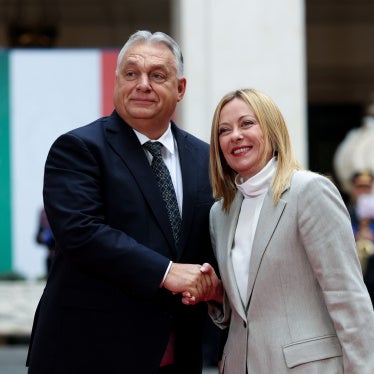Human Rights Watch today condemned the failure of the Italian government to prosecute Abdullah Ocalan, the leader of the Workers' Party of Kurdistan (PKK), for crimes against humanity, such as extrajudicial executions and massacres of civilians. The Kurdish leader, who has been in Italy since mid-November, was allowed to flee the country this past weekend on the eve of a court decision on whether Italy would prosecute him. His whereabouts are currently unknown.
"The Italian government in particular, but also the international community as a whole, has in this case missed an important opportunity to signal that those who commit atrocities will be held accountable," stated Holly Cartner, executive director of Human Rights Watch's Europe and Central Asia Division. "The case underscores the need to operationalize the commitments made by Italy and other countries to a system of international criminal justice: they need to enact legislation enabling them to prosecute crimes of universal jurisdiction, such as crimes against humanity. And, though it could not have been a forum for adjudication of this case, they need to ratify the treaty creating an international criminal court, so that future gross violations can be adjudicated outside of the political realm where this case was resolved."
Ocalan is wanted in Turkey on terrorism charges related to the fourteen-year conflict that his PKK has waged against Turkish government forces. Italy declined to extradite Ocalan to Turkey on the grounds that he might face the death penalty there. Upon Ocalan's departure from Italy, decisions by the Italian authorities were still pending on both his request for political asylum in Italy and a possible Italian charge of terrorism against him. In repeated recent public statements, apparently concerned that an Ocalan trial would be politically unpopular, particularly with western Europe's large Kurdish population, Italian Prime Minister Massimo D'Alema encouraged Ocalan to leave the country. Italian authorities expressed relief upon Ocalan's departure.
In a November letter to Prime Minister D'Alema, Human Rights Watch praised the decision not to send Ocalan to Turkey to stand trial, where the rights group warned against a substantial risk he would face torture, as well as the possibility of the death penalty. At the same time, Human Rights Watch pressed Italy to hold Ocalan accountable for crimes against humanity committed under his command, or to send him to another country that would undertake the prosecution in accordance with international law.
Human Rights Watch's letter to D'Alema recounted that between 1992 and 1995, the height of the conflict, Ocalan's PKK is believed to have been responsible for at least 768 extrajudicial executions, mostly of civil servants and teachers, political opponents, off-duty police officers and soldiers, and those deemed by the PKK to be "state supporters." In addition, the PKK committed numerous large-scale massacres of civilians, usually against villagers or villages that were believed to be connected with the state civil defense "village guard system." In twenty-five such massacres committed between 1992 and 1995, 360 people were killed, including thirty-nine women and seventy-six children. These actions were not committed by rogue units or commanders, but were PKK official policy.
Human Rights Watch has often reported and condemned abuses committed by Turkish government forces, as well as the PKK. "We have repeatedly demanded that the Turkish government investigate and hold accountable those members of its security forces responsible for serious violations of international human rights and humanitarian law committed against the Kurds, including torture, extrajudicial killings, and indiscriminate fire," Cartner explained. "Had Turkey done so, it might have found greater international sympathy for its case against Ocalan. But in either case, under international law, abuses committed by one side cannot under any circumstances be seen to justify or excuse those committed by the other."
|
News Release
Rights Group Decries Missed Opportunity to Prosecute PKK Leader
Urgent Need for an International Criminal Court Cited
Your tax deductible gift can help stop human rights violations and save lives around the world.
Region / Country
Most Viewed
-
June 3, 2025
“They’re Ruining People’s Lives”

-
April 27, 2021
A Threshold Crossed

-
November 25, 2019
A Dirty Investment

-
January 25, 2024
“We’re Dying Here”

-
November 19, 2012
Losing Humanity



